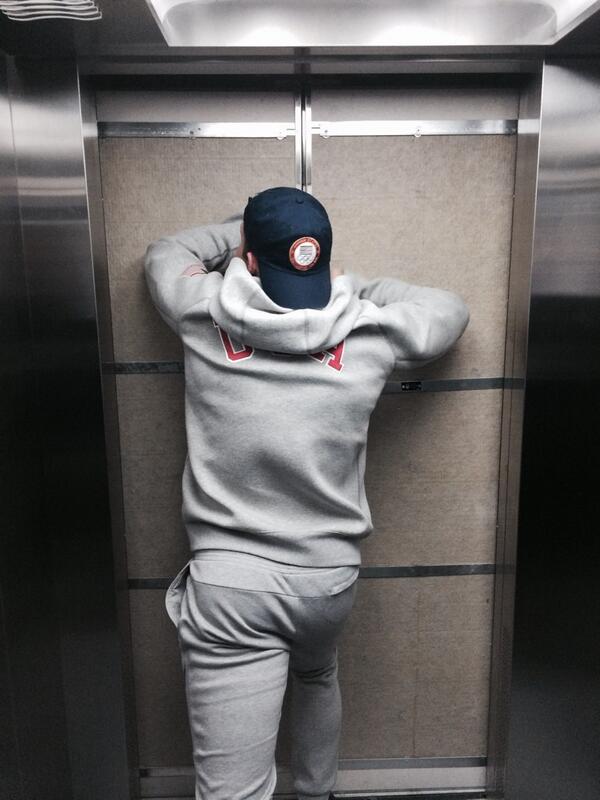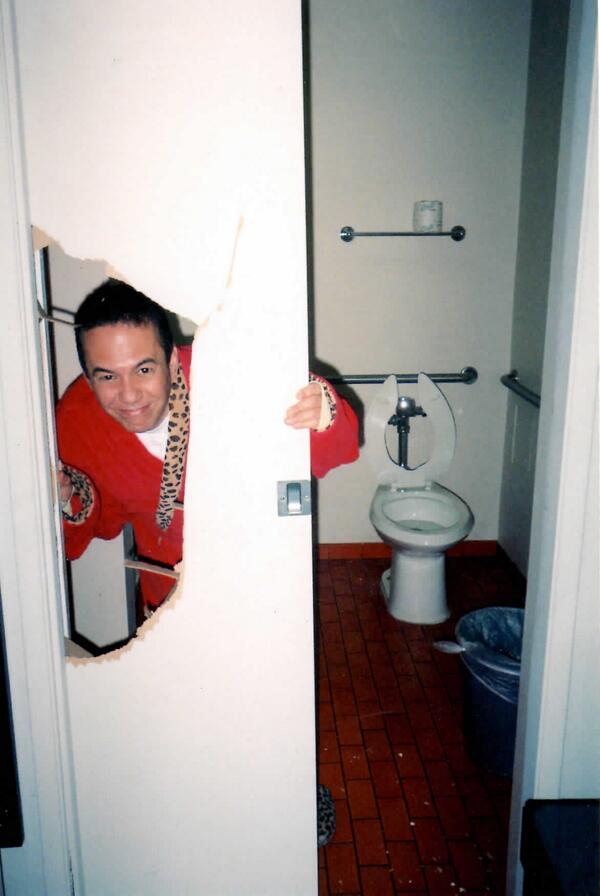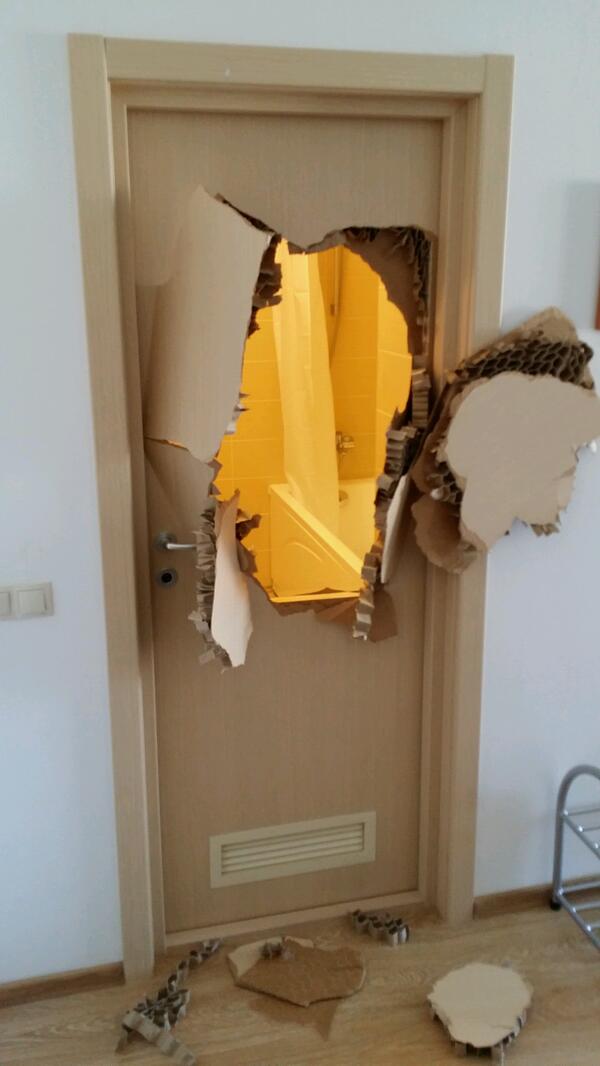Welcome to The Interpreter’s Sochi 2014 Winter Olympics Liveblog. Here, we will be covering the news away from the ski jumps and ice rinks, where activists are being arrested, corruption looms large, and the terrorist threat is very real. See all of our Sochi coverage here, and read Friday’s Sochi Liveblog: The Games Begin. Updates are below.
2133 GMT: We couldn’t make this stuff up. Johnny Quinn, the American bobsledder who punched his way out of his bathroom door this weekend (jump to earlier update) has gotten stuck in an elevator.
Of course I'm with @JohnnyQuinnUSA when the elevator door breaks and we get stuck! Good thing I'm with him! pic.twitter.com/cnVQlDgQV4
— Nick Cunningham (@BOBSLEDR) February 10, 2014
No word on how he got out, but celebrities are having plenty of fun with this:
True story. I once crashed through the bathroom door at The Tonight Show. Take that @JohnnyQuinnUSA . #Olympics pic.twitter.com/JO8ZVKX4ma
— Gilbert Gottfried (@RealGilbert) February 10, 2014
1908 GMT: One of the promises made by Russian President Vladimir Putin is that by building the facilities in Sochi, Russia will have helped create facilities that will continue to reap benefits for the Russian economy and the Russian people.
However, due to the high price of the construction at Sochi, some investors are worried that they will not be able to recoup their costs. In order to avoid default, some have advocated for the construction of casinos and the creation of a “gambling zone.” However, President Putin is against the idea. RIA Novosti reports that Putin is concerned that making Sochi a gambling zone will attract on a certain kind of visitor and will push families out. Sochi, Putin argued, should be an investment from which all Russians benefit.
It is ironic, then, that Sochi may just be a $51 billion handout to recipients of political favoritism, but that the casinos will not be allowed in under this logic.
Read our translation, Putin is Opposed to Opening a Gambling Zone in Sochi: Russian President wants to preserve a “family atmosphere.”
1843 GMT: Russian President Vladimir Putin has expressed concern that the non-Olympic facilities in Sochi (housing, hotels, ect.) may not be up to standards, which might prove a liability to the economy once the Olympics are over.
With the hashtag “#SochiProblems” trending worldwide, we’re not sure what would give him that impression.
Read our translation of RIA Novosti’s artice: Putin Concerned About Non-Olympic Construction in Sochi — Are Sochi’s buildings usable once the Olympics are over?
1715 GMT: One of the most controversial parts of Friday’s opening ceremonies was when Russian figure skater Irina Rodnina was chosen to help light the Olympic cauldron. Rodnina had been widely criticized when she tweeted a racist picture of the President and Mrs. Obama last September.
Now, Rodnina has just sent these tweets:
I respect the Obama family and apologize for not clearly stating earlier that I don't support the tweeted photo or racism in any form. (1/2)
— Irina Rodnina (@IRodnina) February 10, 2014
My account was hacked and I should have shown better judgement in my initial response and handling of the event. (2/2)
— Irina Rodnina (@IRodnina) February 10, 2014
1709 GMT: In Russia, the vast majority of media outlets are either directly operated by the government or have strong political or economic ties to government parties, offices, or officials. This is especially true in the broadcast media. The bias of these channels is both very clearly pro-Putin, but is also highly powerful. In Th Interpreter’s “A Brief History of the Russian Media,” we examine how the Kremlin has developed significant control over Russian news, ensuring that they not only control the message but also the methods of distribution. This problem has become even worse since the government has decided to reorganize RIA Novosti, a highly regarded news outlet, under the control of a pro-Kremlin propagandist.
The Kremlin’s control of the media has a significant impact over both foreign and domestic policy. One example is Russia-24’s television coverage of the pro-European Union protests in Ukraine. According to a report by the independent Novaya Gazeta, even the weathermen are engaged in a propaganda war against the Ukrainian opposition.
All of this makes recent developments very disturbing. TV Rain, the “optimist” channel, Russia’s only independent TV station, is being probed by prosecutors as government officials debate shutting it down completely. The reason? TV Rain ran a poll that asked whether the siege of Leningrad during World War II, which left millions dead, was worth the prize. The poll was attacked as being anti-Patriotic, but may be used as an excuse to close another independent news outlet. Last week The New Yorker examined the issue, and illustrated how the Russian government could use its partnership with Russian corporations to eliminate a critic while appearing to have not intervened in the manner:
The first call for cutting off the TV Rain broadcast came from the president of the Russian cable-TV association, who is also a co-owner of a major cable provider. The other big-name providers quickly followed suit. A few days before the opening ceremony of the Sochi Olympics, the Kremlin may not want to be seen as closing the only privately owned channel in Russia that pursues a nongovernmental editorial line. It is much more convenient to have the channel squelched by a cable operator driven by the public outrage over TV Rain’s “blasphemous” question. Some loyal TV Rain viewers protested cutting off the station, and have cancelled their subscriptions with the cable providers. But the protests of the liberal minority tend to be dismissed in Putin’s Russia.
This is just the newest problem facing Russian independent outlets. How many of them will be willing to question the Russian government’s version of history, as presented at the Olympic opening ceremonies on Friday?
1627 GMT: While the Russian media may be complaining that Western journalists are too focused on Sochi’s dogs (see previous update below), there are plenty of Russia worried too. Animal shelters have popped up across Sochi as activists struggle to save dogs from poisoning at the hands of government contractors. A Russian oligarch, Oleg Deripaska, has donated a large amount of money to rescue some of the dogs as well.
This weekend, one Russian man was arrested in Red Square for protesting against the treatment of Sochi’s dogs. ABC reports:
Three activists unfurled a banner near Red Square that read “Bloody Olympics” and depicted a puppy covered in blood. A policeman approached and pulled the banner out of the activists’ hands, and one man was detained while the other two fled.
Any unauthorized protest in Russia is banned, so even unfurling a banner or waving a flag may get you arrested.
1613 GMT: Is the Western media being unfair to Russia. The Communist newspaper Pravda thinks so. It argues that other Olympics have had security issues (Munich, Atlanta), and that the Russian government is more than able to deal with them. Pravda also suggests that there is a strong Western bias against Russia that has been growing in recent years, and that this bias is affecting the way that journalists are covering the Olympics.
It’s an interesting read that contains several opinion polls that flush out how people in the United States view Russia — and more interestingly, how the Russian people view the United States.
Read Sochi’s Dogs Crossed the Road to the West
Pravda is echoing many sentiments published in Russian newspapers this weekend, especially those media with close ties to the Russian government. While many of Russia’s independent media are also very proud of hosting the Olympics, some of them are also afraid that the Russian government, the Russian media, and the focus on sports, will all distract from the underlying problems inside Russia, and inside the organization of the Olympics themselves.
1605 GMT: In the days ahead of the start of the games in Sochi, journalists traveling to the sub-tropical city discovered that the facilities were not ready for their arrival. Roads were unpaved, wild dogs were being poisoned in the streets, and the hotels where the journalists were supposed to be staying were in hilarious states of disrepair (see some of the best examples here).
Well, now there is a new “Sochi hotels are a disaster” story to add to the list. This weekend, an American bobsledder, Johnny Quinn, found himself locked in his hotel bathroom. The door was jammed, there was no phone, and so he did the only thing he could do. One of his teammates reports:
My teammate got stuck in the bathroom. Barefoot, naked and alone he called his inner strength. @JohnnyQuinnUSA pic.twitter.com/xvlKtYpaaT
— Dallas Robinson (@DRobUSA) February 8, 2014
And so the hashtag “#SochiJailBreak” was born.
Sadly, however, Johnny Quinn is not the only one who found himself imprisoned over the weekend because of the Sochi Olympics. On Friday, at least 14 activists were arrested across Russia. Ten were arrested in Moscow for waving rainbow flags while singing the Russian national anthem in Red Square. Four more were arrested in St. Petersburg for simply holding a banner, upon which was written a quote from the Olympic charter, “Discrimination is incompatible with the Olympic Movement.”
Many other are prisoners in their own town, as the residents of Sochi have to deal with tons of industrial waste that has been dumped in their city, far from the eyes of journalists attending the Olympic games. For many Russian’s, “#Sochiproblems” will be harder to break free from.



